MercoPress. South Atlantic News Agency
Tag: North American Free Trade Agreement (NAFTA)
-
Tuesday, March 6th 2018 - 10:00 UTC
Trump speaks openly of a “trade war”; links tariffs on steel and aluminum to a redrafted Nafta
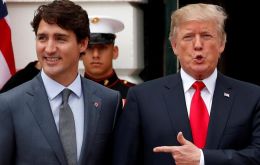
U.S. President Donald Trump said on Monday the U.S. is not backing down on its decision to impose 25% tariffs on steel imports and 10% tariffs on imported aluminum products. Before a White House meeting with Israeli Prime Minister Benjamin Netanyahu, Trump suggested Mexico and Canada could be exempted from the planned tariffs if a new and “fair” North American Free Trade Agreement (NAFTA) is reached.
-
Thursday, February 8th 2018 - 09:11 UTC
With NAFTA on the cliff, Mexico betting strongly to update free trade agreement with Europe
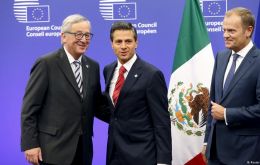
Mexico believes it can conclude a new free-trade agreement with the European Union before the end of February, Mexican officials have said. The EU and Mexico intend to update a trade deal agreed 21 years ago that largely covers industrial goods. They want to add farm products, more services, investment and government procurement, and include provisions on labor standards and environmental protection.
-
Friday, November 17th 2017 - 08:11 UTC
NAFTA gives priority to technical talks to avoid open political clashes
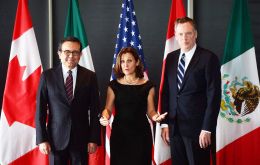
The politicians overseeing the renegotiation of NAFTA won't be meeting face to face at the end of this round of talks, unlike the previous four rounds of discussions.
-
Friday, October 13th 2017 - 12:59 UTC
Meirelles optimistic about congressional approval of pensions' reform

Brazilian Finance Minister Henrique Meirelles said on Thursday “there’s a very good chance” that the country’s proposed pension reform bill will be approved by the end of the year. Addressing a question-and-answer session at an Institute for International Finance meeting in Washington Meirelles said that it would be simpler to pass the bill this year than next year because of political challenges that could come with Brazil’s upcoming presidential election in October 2018.
-
Wednesday, September 27th 2017 - 06:18 UTC
NAFTA: Trudeau predicts “tough days ahead” ahead for negotiators
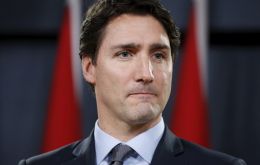
The top U.S. negotiator at talks to modernize the NAFTA trade pact dismissed questions about why his team had so far failed to produce specific proposals on key issues, saying “I don’t see a problem.” Officials from the United States, Mexico and Canada are in Ottawa for the third of seven planned rounds of talks.
-
Wednesday, August 30th 2017 - 07:28 UTC
Mexico tells “twitter” Trump it will not renegotiate NAFTA via social media
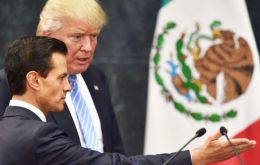
Mexico will not renegotiate the North American Free Trade Agreement or any other aspect of its relationship with the United States via social media or the press, the Mexican government declared Sunday.
-
Tuesday, August 15th 2017 - 10:56 UTC
Canada adopts resolute stance ahead of NAFTA renegotiation scheduled for Wednesday
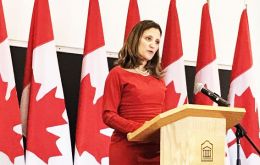
Canada signaled Monday that it would not give much, if any, ground on the benefits it provides to domestic industries when it joins the U.S. and Mexico to begin renegotiations on the North American Free Trade Agreement this week. A key issue for the U.S. is getting Canada to stop policies that boost its dairy, poultry, and timber industries.
-
Saturday, July 22nd 2017 - 23:04 UTC
NAFTA members agree negotiations round; Mexico insists on strict timetable
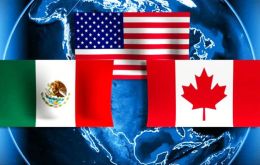
United States, Mexican and Canadian officials have agreed to an aggressive timetable to renegotiate the North American Free Trade Agreement (NAFTA), sources said, aiming to conclude early next year to avoid Mexico’s 2018 presidential elections.
-
Friday, May 19th 2017 - 09:13 UTC
Trump sets off renegotiation of Nafta in a divided Congress

The Donald Trump administration took the first step toward renegotiating the North American Free Trade Agreement, plunging into a battle that pits some Republicans and industry supporters of the pact against Democrats and some of the president's most ardent backers.
-
Friday, April 28th 2017 - 11:09 UTC
Trump opts to renegotiate NAFTA agreement; talks to Peña Nieto and Justin Trudeau
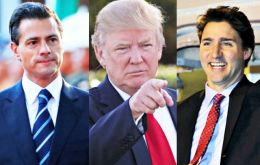
President Trump told reporters Thursday he had been planning to terminate the North American Free Trade Agreement within days, but decided to try to renegotiate the agreement instead. The president held out the possibility of killing the trade deal later if the negotiations fail.
